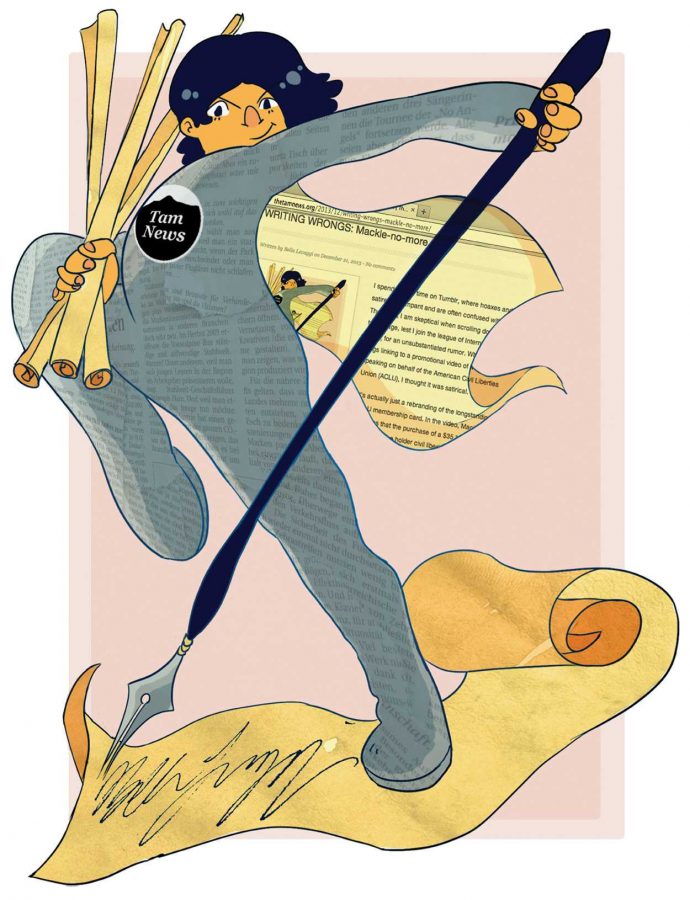When I was five, I thought that dragons were real. “Dragon Tales” captivated me and I used to “wish and wish with all my heart” that I too could one day fly away to Dragon Land and learn valuable life lessons alongside my scaly friends. Alas, I have since been told time and time again that dragons do not exist. Armed with the pain of losing such childhood wonder, I have since entered the world of grown-ups and social justice advocacy in search of other fantastically mythical beasts. What have I found? Aside from unmasking Santa Claus and the supposed integrity of American politics, I’ve overturned mossy rocks and fallen logs to unearth the misplaced and unfounded notion of reverse oppression—specifically the existence of reverse racism, heterophobia, and misandry.
My fellow ex- and current AP U.S. History students know about Alexis de Tocqueville and his ideas of tyrannies of both the majority and the minority. The latter is a state in which a small group of people wield power and favor their own opinions over those of the larger, powerless majority. Considering the universal nature of “Harry Potter,” I’m pretty sure that Voldemort and his Death Eaters constitute an accessible example of a tyranny of the minority.
Sometimes, minority members say that they hate majority groups. But vocalizing a “hatred” for a majority doesn’t suddenly become oppressive to that group, because the words carry little threat or history of violence. In mid-March, for example, the New York Times reported that a man shot a lesbian couple to death in Texas; at the end of March, a Muslim man was also murdered, this time in Sacramento—not too far from relatively safe and secure Mill Valley. Oppression carries clout. Because the hate of women who get laughed out of engineering and people of color shot down for wearing hoodies hold little force, you can’t really call their speech “oppressive.”
Phrases like “I hate [insert majority group here]” can be perceived as reverse oppression perpetuated by de Toqueville’s tyranny of the minority. With closer examination, though, something tells me that a few people who’ve suffered institutionalized discrimination bemoaning that fact is somewhat different than Neil Patrick Harris, Oprah, and Dianne Feinstein taking over the government. (Although, implied suspension of basic human rights aside, that does sound like a pretty awesome government.)
I know for a fact that I’ve voiced my own personal disdain for majority groups. I’ve railed against the daily microaggressions that pierce my skin like a thousand pinpricks, and against the uninformed— but still hurtful—words that slip from the mouths of friends and family. The words “I hate [insert majority group here]” come not from a desire to do damage, but from a place of hurt. In the wake of microaggressions, sometimes the best thing for soothing the bruises is to speak out (though Vine compilations of cats are also soothing).
I have found that statements disparaging majorities largely target a system that both overlooks and actively squashes the square pegs who don’t fit into an idealized vision of round holes. The words tend to be triggered when people in our lives who are part of that exclusive system expose the benefit of an ignorance that can come with carrying a membership card to the club. By blaming the system, the problem becomes less about your friend hurting you and more about an intangible entity. (The Patriarchy is a personal favorite.)
For this and other reasons, I have never felt guilty about saying I “hate” a majority group. I don’t mean that I hate you as a person (unless you find Crocs stylish) or whatever unalterable facet it is that makes us different. No, I mean it because I hate the system that gives privilege to your difference; to the system that calls you “normal” and delegates the rest of us into insensitive cubby holes hastily labeled “Other.”
If discomfort and disdain for an inequitable system goes unquestioned, I have little faith that we can ever effect change. It’s important to listen when someone condemns systems, because nothing can change without recognizing problems.
For example, consider a hypothetical scenario in which I take up two parking spots on Miller Avenue. Unless someone were to point out my illegal and oblivious blunder, it’s unlikely that I’d fully recognize the way that my actions had been ignorant of others’ needs.
We can’t facilitate change by asking nicely. The pages of history are strewn with the protests and marches and uprisings of those who pledged themselves to speaking up. And as much as I wouldn’t conflate words of hurt with activist rhetoric, there is truth in them. If someone feels so hurt that they speak to their “hatred” of their oppressive system within earshot of those who benefit from said system, then that’s probably even further validation that a problem exists.
Shows like “Dragon Tales” taught us to brave and kind and true. So just as I still believe that dinosaurs offer a bridge between dragons and reality, so too do I think that a middleground between critically voicing hurt, reform of violent systems, and the feelings of everyone involved can exist.



